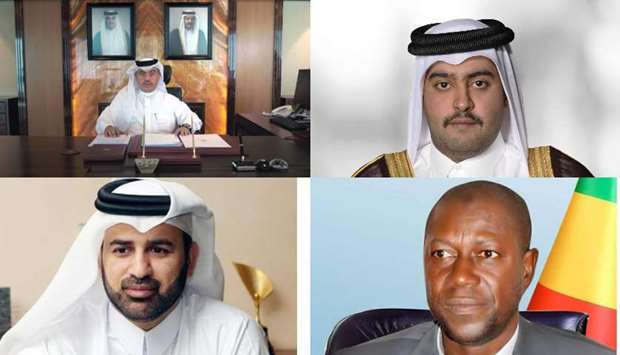* HE the Minister of Commerce and Industry inaugurated the 7th Doha Islamic Finance Conference virtually on Tuesday
HE the Minister of Commerce and Industry Ali bin Ahmed Al-Kuwari said the “remarkable growth” achieved by Islamic finance in Qatar has been due to the “pioneering” legal and regulatory framework governing the sector in the country.
Inaugurating the 7th Doha Islamic Finance Conference virtually on Tuesday he praised the “outstanding” experience of Islamic finance in Qatar, as Qatari Islamic banks are ranked among the largest in the world.
Furthermore, Qatar is one of the largest Islamic finance markets in the world. Local Islamic banks’ assets reached QR415.8bn in 2019, compared to about QR350bn in 2018.
Qatari Islamic banks, he said showed "strong performance and high growth rates" in their profits in 2019. Their revenues reached QR18.6bn, an increase of 15.4% compared to 2018. The revenues of financing and investment activities accounted for 90% of the Islamic banks’ total revenues.
Funding from Islamic banks to the real estate sector amounted to 36.4% of the total funding it received from the banking sector, and 35.6% in the industrial division, al-Kuwari said.
In view of the entities financed by Islamic banks, the private sector has greatly benefited from these banks’ credit, especially in real estate, trade, financial activities, and insurance, as well as in the small and medium-sized companies segment. In this regard, Islamic banks today represent one of the pillars of the stability of Qatar’s financial sector.
Al-Kuwari noted that Islamic economic system as a safe haven for sustainable development and a bulwark against economic crises, through its pivotal role in building a just and integral economic system.
The minister began his speech welcoming all the participants and expressing his gratitude and acknowledgement to HE the Prime Minister and Minister of Interior Sheikh Khalid bin Khalifa bin Abdulaziz al-Thani for his generous sponsorship of the conference.
Al-Kuwari said he was proud of Qatar’s “great” experience in digital technology, as it has been working for several years on adopting technological and digital solutions in building its economic and financial system to achieve the Qatar National Vision 2030.
In addition to the efforts exerted to establish an advanced and integrated infrastructure for digital technology in all sectors, including the financial sector, Qatar Central Bank launched Qatar FinTech Hub in partnership with Qatar Financial Centre and Qatar Development Bank to provide programmes supporting entrepreneurs and promoting innovation and development in the field of financial technology.
On initiatives aimed at consolidating Qatar’s position as an ideal investment destination at the regional and global levels, the minister spoke of the 'Single Window Platform' launched by the Ministry of Commerce and Industry. This aims at assisting investors in the various stages of establishing companies, starting from the planning to registration procedures, and all the way to obtaining the necessary licenses through an electronic interface that connects investors, at any time and where ever they are, with about 18 government agencies through a single platform.
Al-Kuwari also referred to the draft decision to establish the Artificial Intelligence Committee in Qatar. This decision was recently proposed by the Cabinet. The committee will have representation from the Ministry of Commerce and Industry, government agencies, research institutions and universities.
The Artificial Intelligence Committee shall handle developing mechanisms to follow up and implement Qatar's artificial intelligence strategy, oversee programs and initiatives related to this field, as well as support emerging companies specialising in artificial intelligence and scientific research.
He noted that the conference comes under the title "Digital economy and sustainable development" with the aim of shedding light on the prospects for sustainable economic growth in light of the major changes that the world is witnessing today, following the Covid-19 outbreak, “which has proven - despite its negative repercussions - that we all live within a single international community that requires all countries to work together to address common challenges in all fields especially at the economic level.”
Minister of Religious and Worship Affairs of the Republic of Mali Dr Mohamed Kony expressed his gratitude to participate in such conference, stressing the distinction of Islamic finance and its effects on the individual and society in achieving social justice.
He explained that Islamic finance seeks to maximise collective benefits, be compatible with Shariah laws, and protect humanity from injustice.
He also stressed the need for mutual cooperation to support Islamic finance and welcomed experts, scholars and intellectuals to visit the Republic of Mali to benefit from their experience in the field of Islamic finance for the benefit of the Mali society.
Sheikh Mohamed bin Hamad bin Jassim al-Thani, chairman and managing director, Dukhan Bank, the strategic partner and exclusive sponsor of the conference, said, “Qatar is one of the first countries to get into the experience of Islamic finance since the early 80s. And it has continued to grow over the past years to become the fifth largest market for Islamic finance in the world, with assets worth $144bn. Islamic banking assets constitute 26% of the total banking assets in Qatar.”
Prof. Dr. Khalid bin Ibrahim al-Sulaiti, chairman, Organising Committee and vice chairman, Bait Al-Mashoura Finance Consultations Company said, “After six editions of the conference had discussed the developments and challenges of Islamic finance, we are here in our seventh edition of the conference facing the biggest financial crisis confronting the world since the second world war, at a time the crisis has spillover effects on both aspects of sustainability- the society and the economy. The situation imposes on all the stakeholders and decision makers to propose the 17 ideas and solutions for lessening its impact while bolstering the recovery and economic revival post-crisis.”

